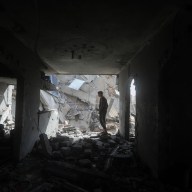HANWANG, China – Workers in hazmat suits crisscrossed collapsed communities in trucks Monday, spraying disinfectant as part of a government campaign to prevent disease outbreaks among five million left homeless by last month’s earthquake.
Providing safe food, drinking water and temporary shelters were a priority after the May 12 earthquake that killed nearly 70,000 people, the Health Ministry said. Bodies found in the rubble were being cremated or buried.
“If we can do those four things properly, we have the confidence to guarantee there will be no epidemics after the disaster,” Ministry spokesman Mao Qun’an said. He said there was no evidence of contagious disease in the quake zone, where survivors are crammed into tents and other temporary shelters.
Any bodies that could not be cremated were being buried far from natural water sources, and more than 10,000 injured people were transferred to hospitals outside Sichuan province for treatment, Mao said in an interview posted on the central government’s website.
The smell of disinfectant lingered in Hanwang’s silent streets, where police were also on patrol for thieves.
Xu Sunyong watched from outside his heavily cracked building as self-employed movers brought down padded chairs and even the front door of his sixth-floor apartment. Thieves had broken in and stolen his appliances.
“Those people deserve to die,” he said with disdain.
The confirmed death toll Monday was 69,019, up just three from a day earlier. An additional 18,627 people are missing, government spokesman Lu Guangjin told reporters.
In a sign of how difficult conditions remain in parts of Sichuan, thousands of soldiers searched remote mountains Monday for a military helicopter that crashed 48 hours earlier while transporting earthquake victims.
The Russian-designed Mi-171 transport was carrying 19 people, including 14 who were injured in the quake, when it flew into fog and turbulence and crashed near the town of Wenchuan on Saturday, state media reported. State broadcaster CCTV said 4,000 soldiers were searching for the wreck.
Meanwhile, soldiers completed work on a channel to divert water from a lake formed when landslides triggered by the earthquake blocked the Tongkou River. Water levels in the lake had been rising steadily and threatened to flood surrounding areas, prompting authorities to evacuate nearly 200,000 people.
Nine surveillance cameras were set up at the lake Sunday, the Chengdu Evening Newspaper reported, quoting Zheng Ming, an official with a Shanghai telecom company with a team at the site.
Downstream, many villages were empty Monday after authorities ordered people out, although some families were staying put.
A reconstruction committee under the National Development and Reform Committee, the cabinet’s top economic planning body, has agreed on a list of tasks and a general schedule for completion, the national committee said in a news release Monday.
Committee members have dedicated themselves to a reconstruction plan that is “of high quality, that will stand the test of time, allow victims to rebuild their homesteads, and create a solid foundation and conditions for wider scale reconstruction,” the news release said.
Authorities have rushed to construct tent camps and prefabricated housing for the millions of homeless ahead of the summer rainy season and the accompanying disease-bearing mosquitoes.
Hossam Elsharkawi of the International Federation of Red Cross and Red Crescent Societies said his organization was bringing in purification units to provide clean water for 30,000 people.
“The government is doing an excellent job in urban areas, but it’s taking time in places like this because it is so dispersed,” said Elsharkawi, speaking in the village of Jiulong village, just north of the provincial capital of Chengdu.
He said the federation expected to be helping with relief work in Sichuan for three years and would soon bring in 100,000 tents.
Elsharkawi praised the government relief effort. “They can teach the world a thing or two on responding to such large-scale disasters,” he said.


















